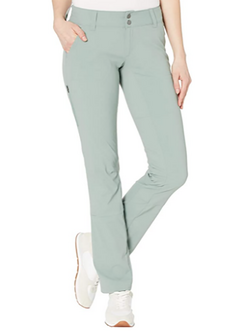
A great pair of pants for hikers.
A great pair of pants for hikers.
Available in 13 flat colors. These pants are 96% nylon with 4% elastane so they have a bit of give in the way they fit. A classic style that flatters most figures. An elastic waist allows for easy movement and extra comfort.
Some users report that the fabric can pill. Pockets aren’t big enough for some.
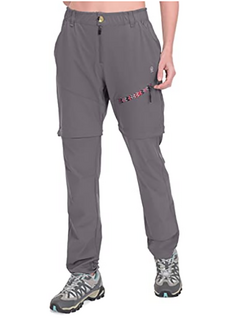
A versatile pair of pants that will have you ready for anything.
A versatile pair of pants that will have you ready for anything.
Available in 15 colors, in both Capri and full-length styles. Easy zipper closure. Can quickly be converted to shorts. Fabric is water-resistant, quick-drying, and offers UPF50+ protection. Pants' knees are reinforced for extra toughness.
Some quality control issues.
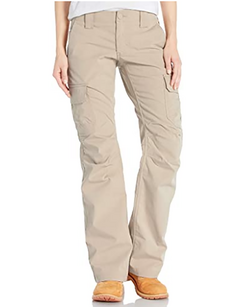
A solid option from a top-quality brand.
A solid option from a top-quality brand.
Available in solid colors as well as camouflage. Rip-stop fabric is 100% polyester and can withstand abuse. Machine-washable. Fabric is odor-resistant as well as quick-drying. This pair includes front hand pockets, 2 cargo pockets, and a rear pocket.
Pricier than other options. Runs small.
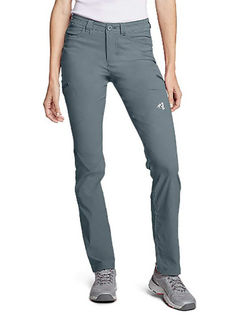
The colorful choice for curvier gals.
The colorful choice for curvier gals.
Available in earthy solid colors. An eco-friendly pant whose fabric is made in a sustainable way. The rip-stop fabric is machine-washable and quite durable. This fabric repels water and includes UPF50+ protection. Packs light, and can fold very small for crowded backpacks.
Not flattering for all body types.
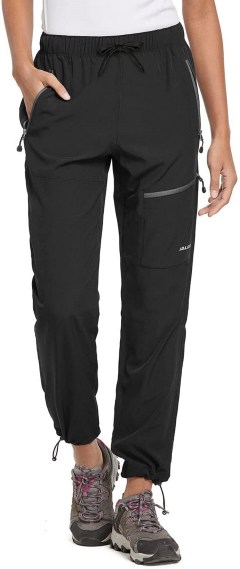
This lightweight pair of pants is a good choice for outdoor activity in warmer weather.
This lightweight pair of pants is a good choice for outdoor activity in warmer weather.
Made with a polyester and spandex blend that doesn’t feel heavy, is water-resistant, and will dry quickly. The stretchy fabric allows for comfortable movement, and has built-in SPF. Has multiple pockets and an elastic waist. The jogger-style cuffs can be adjusted.
The fit is a little inconsistent, and fabric isn’t the most durable.

We recommend these products based on an intensive research process that's designed to cut through the noise and find the top products in this space. Guided by experts, we spend hours looking into the factors that matter, to bring you these selections.
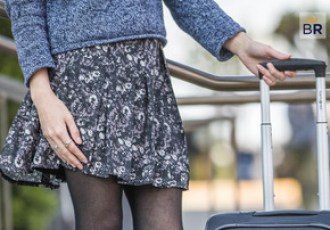
Whether you’re going for a casual afternoon hike or trekking through a weeklong camping trip, you want to be appropriately dressed. Women’s hiking pants make it easy to enjoy your adventure in comfort in a garment that can hold up to the rigors of the outdoors.
Hiking pants are an excellent investment for anyone who regularly goes hiking. Of course, you can hike in other pants, but these are designed to withstand the elements, dirt, moisture, wind, and more. They’re comfortable enough for quick walks on well-maintained trails, and they’re ideally suited to withstand more challenging trips on rugged wilderness trails.
Looking for a great pair of hiking pants? First, you want to look for styles and materials that work best for your usual hiking trips. Next, make sure they fit correctly so that you can move easily. Finally, identify convenient features, such as pockets and ventilation zippers, to ensure you end up with the best pants for your next hike. A good buying guide and recommendations can help.

If you’re wondering if you really need a pair of special pants for hiking, it helps to understand their benefits and how they can make your outings more enjoyable.
Lightweight: These pants usually weigh less than other choices, such as jeans, so they’re more comfortable on long hikes and won’t slow you down on the trails.
Water-resistant: They typically offer some resistance to moisture and dry quickly, so you won’t get wet and cold if you cross streams or get caught in the rain.
Breathable: The materials are typically breathable as well, helping you adjust to warmer weather.
Storage: Hiking pants tend to have plenty of large pockets, making it easy to carry small items within easy reach, such as lip balm, sunscreen, trail maps, and phone.
Adaptability: Some hiking pants offer additional features, including zippers for added ventilation or the ability to convert to shorts to provide greater versatility than typical workout pants or jeans.
Hiking pants are available in several styles, and your choice will depend on the type of hiking you do, the weather, and other factors. The most common styles include the following:
Traditional/standard styles provide the coverage you’d expect from a pair of pants, so you’re protected from the sun, wind, rain, rocks, brambles, thorns, and bugs. Some traditional hiking pants are lightweight and better suited for warmer weather, while other pairs are heavier and designed for colder weather. In general, traditional pants work best for hiking trips in sunny or cool, wet weather.
Convertible pants have zippers over the knees that let you convert them to shorts. This style comes in handy for longer trips because it lets you pack fewer items. Convertible hiking pants also make it easy to wash your legs if the trail is muddy. Most also allow you to unzip the legs part way if you need ventilation.
Roll-up pants have buttons or elastic at the calves that let you convert them to capris for improved ventilation. They work well for warmer weather and are usually easier to adjust than convertible styles. While you can roll up traditional pants, roll-up styles are designed to stay in place as you move, so they’re ideal for more vigorous hikes.
Tights are similar to leggings and offer a snug fit that can help improve mobility. They work well if you’re hiking on trails where you expect to encounter heavy brush and brambles.
Most hiking pants are made of synthetic materials, such as nylon, polyester, and blends. Many pairs also contain some spandex to give the pants some stretch to increase comfort and mobility.
For hiking on more rugged trails, you might want to look at pants made of ripstop fabric. These are tightly woven, so they’re more durable and less likely to tear than synthetic blends.
It’s best to avoid cotton hiking pants. Cotton doesn’t wick moisture away from the skin and doesn’t dry quickly, so it can leave you soaked and uncomfortable if you encounter rain or streams.
Getting the right fit is essential if you want your hiking pants to be comfortable. Pants that are too tight can cause irritation and chafing, while those that are too loose can pose a tripping hazard.
For the most part, it helps to choose pants that are somewhat formfitting. That’s why styles that include spandex are an excellent option. The stretchy fabric helps the pants fit snugly without being restrictive or uncomfortable.
It’s always a good idea to try on your pants before wearing them on a hike. Wear them around the house to see if you can squat, sit, and bend easily. Pants with a gusseted crotch are also more comfortable because they reduce chafing.
Some hiking pants have stirrups to keep the cuffs from bunching up over your shoes or boots. They can also keep insects from getting inside your pants.
The weight affects how warm pants are and how heavy they are to carry in your pack. Hiking pants are available in various weights. Most weigh between 9 and 12 ounces, so they’re not particularly heavy.
Lightweight pants work best in warmer weather and are easier to pack for long trips that require more gear. Lightweight pants can enable you to move more quickly too. If you already have heavy items in your backpack, you might want to opt for pants that are as lightweight as possible.
Heavyweight pants are typically necessary to provide adequate warmth in cold weather on the trail. Heavier pants are usually more durable than lightweight pants, but they can weigh down your pack.
Hiking pants usually have an adjustable waistband so you can customize the fit. The waist style differs from pair to pair, including the following:
Elastic waistbands are stretchy and can accommodate a range of waist measurements. You’ll find this type of waistband on pull-on pants that don’t have a button or fly closure. It’s comfortable, but it doesn’t offer as much adjustability as other styles.
Drawstring waistbands let you customize the fit of your pants by tying the waist as tightly or loosely as you like. These pants usually don’t have a button or fly closure either. Some hikers aren’t a fan of the drawstring waist, though, because it can get in the way of a backpack’s hip belt.
Integrated belt waistbands have a built-in belt that lets you tighten or loosen the waist as you need. While other pants have loops to secure a separate belt, many hikers prefer the integrated belt because there’s less bulk to get in the way of your backpack’s hip belt. These pants usually have a button and/or fly closure.
Nearly all hiking pants have at least one pocket. However, you can find some with more pockets and different pocket styles. Back and front pockets at the hip are the most common, but you can also find some cargo pants with additional pockets on the thighs and lower down the legs.
Multiple pockets on your pants make it easier to organize your belongings. You might also want your pants to have at least one zippered pocket so that you can secure certain items, such as your phone.
Some hiking pants are designed with articulated knees to allow for easier movement on the trails. These pants have a bend in the knees, so they move with your joints’ natural motion. Your range of motion might be limited in regular straight-legged pants.
To ensure you’re always comfortable, some hiking pants have zippers that you can open to allow for additional airflow. These zippers are especially helpful when hiking in warm weather.
Water resistance: Many hiking pants offer at least some resistance to water. These have a coating that helps repel moisture, so you can hike through streams and rain without worrying about ending up with soaked pants. However, the more water-resistant the pants, the less breathable they typically are. That means that water-resistant pants are usually best for cold weather.
If you don’t want water-resistant hiking pants, look for some made of a quick-drying material. That way, the pants won’t take too long to dry if they get wet.
UPF: Some pants are made of fabric with an additional ultraviolet protection factor (UPF). UPF indicates how much ultraviolet light can pass through an item of clothing. For example, if you choose pants rated UPF 50, that means that for every 50 units of UV light that hit the material, only one will pass through the pants. If you’re hiking on days with a high UV index, it’s a good idea to wear UPF pants.
Hiking pants typically come in neutral colors, such as beige, tan, gray, and black. Lighter colors are usually better for warm weather because they don’t absorb as much heat from the sun as dark colors. However, darker colors don’t show dirt as readily. Because they absorb heat, dark pants also work well in cold weather.

Even more important than wearing the right pants, you want to have the proper footwear when you hit the trails. Women’s hiking shoes provide effective traction on rough, uneven terrain and help cushion your feet on long hikes.
In addition to a good pair of hiking shoes, the right hiking socks can ensure your feet stay warm and dry. They also offer cushioning that can help keep your feet from getting fatigued or blistered on long hikes.
You want to make sure you have all the gear and supplies necessary to stay safe on the trail, so it helps to carry a backpack for your items. Hiking backpacks are lightweight, easy to carry and offer plenty of pockets to organize your gear.
The most affordable women’s hiking pants are usually traditional or legging styles. They’re typically lightweight, so they’re best for warm weather hikes. They might not have many special features, such as articulated knees and water resistance. You’ll typically pay $15 to $30 for these hiking pants.
These women’s hiking pants are mostly traditional style, but you can also find some convertible and roll-up pants in this price range. The pants are usually mid-weight or heavyweight, so they can work well in moderate to cold weather. They often have special features, including water resistance, ventilation zippers, and articulated knees. You’ll generally pay $30 to $75 for these hiking pants.
The priciest women’s hiking pants are traditional, convertible, and roll-up styles. They’re usually fairly heavyweight, making them ideal for cold weather. They also offer special features, including water resistance, articulated knees, ventilation zippers, and UPF. You’ll typically pay $75 to $150 for these hiking pants.
Some hiking pants are available in multiple lengths, such as short, regular, and long. That helps you find the perfect size for you, so you don’t have to worry about tripping over your pants or hemming them before a hike.

A. Since pants cover your legs, they can help protect you from mosquitoes, ticks, and other insect bites when hiking. Some pants are also treated with an insect repellent to keep bugs away. However, it’s still a good idea to bring separate insect repellent with you to make sure you’re protected.
A. A well-made, high-quality pair can last for several years. However, how often you hike, the ruggedness of the trails and the durability of the fabric can all affect the lifespan of the garment.
A. It depends on the fabric, so always read the care instructions first. Nearly all hiking pants are machine washable, making it easy to clean them after a hike. However, you can also wash most pairs by hand. That comes in handy for extended hiking or camping trips where you might need to clean your pants in a tub or other container.
Get emails you’ll love.
Learn about the products you’re wondering if you should buy and get advice on using your latest purchases.
